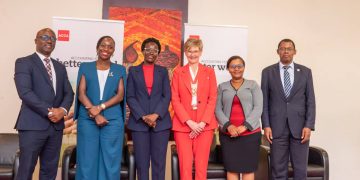Uganda’s public and private sector leaders gathered Thursday morning at the Kampala Serena Hotel for the ACCA Uganda Stakeholders’ Roundtable 2025, a high-level dialogue focused on accelerating the country’s transition from sustainability commitments to measurable impact.
Held under the theme “Building Sustainable Value – From Commitment to Impact,” the event brought together CEOs, policymakers, regulators, development financiers and senior accountants for three hours of intensive discussion on Uganda’s sustainability agenda.
Actions matter more than words
Delivering the keynote address, ACCA Global President Melanie Proffitt FCCA said the world had reached a point where sustainability could no longer be treated as aspirational.

“The theme is significant because it reminds us that actions matter more than words,” she said. “It’s about changing how we measure the success of business—how we account for impacts on people and the planet just as much as profit and loss.”
Proffitt emphasised the rising role of accountants in shaping sustainable business practices globally. “Accountants are emerging as influential agents and architects of change,” she noted. “This is central to the global drive toward sustainability.”

She cautioned that misinformation and greenwashing posed significant risks to global progress, underscoring the importance of universally adopted sustainability reporting standards. “International standards expose bad actors and verify facts. They ensure transparency, trust, and comparability worldwide.”
Proffitt also applauded Uganda’s commitment to adopting IFRS sustainability disclosure standards. “ACCA was delighted when ICPAU announced its roadmap for adopting the IFRS sustainability standards. Climate action is clearly at the heart of Uganda’s agenda,” she said.

We must gauge where we are
In her opening remarks, ACCA Uganda Country Manager Charlotte Kukunda said sustainability had been part of ACCA’s work since 2020, and the roundtable served as a moment of reflection. “We want to gauge where we are in terms of making commitments,” she said. “Sustainability has many faces, and this conversation acknowledges how topical and enduring it is.”

Kukunda noted that Uganda’s broader development agenda, guided by Vision 2040, depends heavily on human capital development—an area in which ACCA plays a major role.
“ACCA’s contribution to this vision is significant,” she said. “Providing knowledge and skills is not just through training but also through research, professional insights, and continuous learning.”

She emphasised that leadership buy-in is essential for progress. “Any agenda has to start from the leadership. Without leaders driving it, we can have conversations but achieve nothing.”
Capacity building, stronger pipelines, and leadership commitment
A panel discussion featuring Derrick Nkajja (ICPAU), Patricia Ojangole (UDB), and Joseph Ssekabira (Deloitte) explored how organisations can translate sustainability plans into tangible impact.

ICPAU CEO Derrick Nkajja said Uganda’s accountants must be equipped to support sustainability reporting. “Everything starts with a plan,” he stressed. “We issued a sustainability roadmap, and when people asked where to start, the biggest gap was knowledge.”

Nkajja revealed that ICPAU has already begun pilot training to help build national capacity. “We are setting the stage for accountants to support sustainability reporting. We hope to roll out the program fully next year.”
Uganda Development Bank Managing Director Patricia Ojangole highlighted a global shift in financing priorities. “Traditional funding sources are shrinking because donors are shifting to climate finance,” she said. “To attract this money, we must demonstrate a strong pipeline of green projects.”

She explained that UDB’s Climate Finance Facility has already strengthened its ability to mobilise concessional financing. “Money will flow where organisations can demonstrate meaningful impact. We must show what green investments mean to us and how our interventions reduce emissions.”
Deloitte Uganda’s Joseph Ssekabira urged organisations to view sustainability as long-term transformation. “It is a journey,” he said. “Organisations must set clear agendas, define KPIs, and assess the level of investment and buy-in at leadership levels.”

He added that robust internal systems and accurate disclosures are crucial for trust. “Stakeholders relying on this information should not be misled.”
By the end of the roundtable, speakers agreed that Uganda’s sustainability ambitions can only be realised through an integrated effort—combining policy direction, professional capacity, financing innovation, and leadership accountability.

Kukunda closed the session with a reminder that professionals have a critical role to play: “Finance professionals, your work is clearly laid out for you. We must move from commitment to real impact.”













